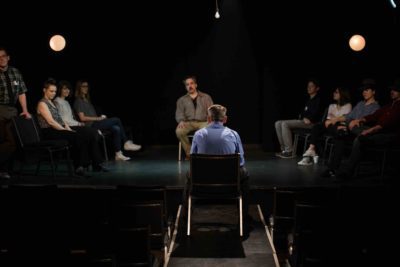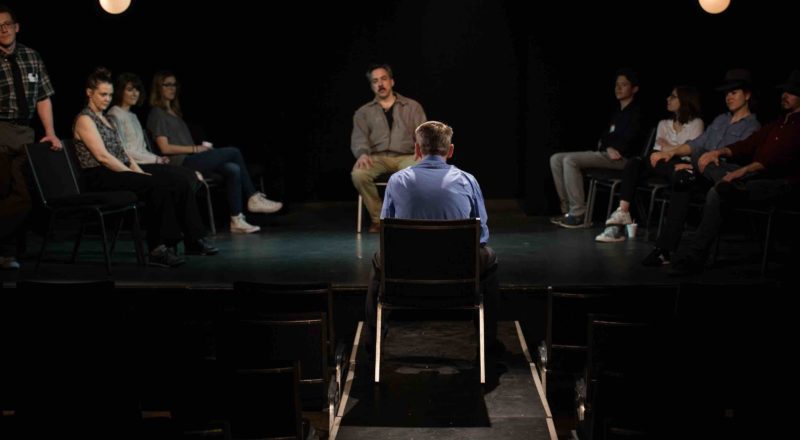INTERVIEW: Welcome to the support group for those who started the Iraq War

In the basement of St. Luke’s Theatre in Midtown Manhattan, a support group meets several times per week. All are welcome, although the subject matter for the evening may not be what visitors are expecting.
This is Baghdaddy, an off-Broadway musical that stages a … wait for it … support group for those who started the Iraq War. The unconventional show, which has been a hit with critics, is the brainchild of Marshall Pailet and A.D. Penedo. Pailet composed the music, co-wrote the book and directs the musical, while Penedo is responsible for co-writing the book and the lyrics.
The attendees at the support group meeting — other than the paying public — are former spies who have duped nations into invading Iraq. The narrative shifts between comedy and drama as it tells this tale of recent history.
The story eventually focuses on the real-life Iraqi defector who claimed he built Saddam Hussein’s bio-weapons lab. The rest is history — or fake news, as they call it today.
Recently, Hollywood Soapbox spoke with Pailet about the new show and its incarnations over the years. Here’s what he had to say:
On the origins and inspiration for the musical …
“The story of Baghdaddy, it started out as a commission by our then and current producer, Charlie Fink. I had done another musical with him about video games with another collaborator, and he was obsessed with this story of this informant named Curveball … who was an Iraqi who immigrated to Germany. This is in 1999 through 2001, and he told the Germans in exchange for political asylum that he had built Saddam Hussein’s weapons of mass destruction. He had built the biological weapons labs.
“We had this theory at the time that Saddam had these things, but we didn’t have any proof. So he basically came in and said, ‘Hey, I built all these things.’ And he didn’t. He made the whole thing up. He was full of sh–, but that information made its way from Germany to the U.S. and all the way at the bottom of the intelligence chain all the way to the top to George Tenent to Colin Powell to the White House. And we used that information as justification to invade Iraq in 2003.”
On how that story became Baghdaddy …
“It’s not about George Bush and Colin Powell and Dick Cheney, but it’s about these kind of mid-level bureaucrat spies along the way who were part of this game of insidious telephone and how they did what they did, why they did what they did. That was kind of the inspiration, and it took us a long time to crack the story.
“It’s such a dense, dark topic. How do we make this digestible for an audience? And eventually we settled on this idea that the audience would walk into a support group for people who started the Iraq War, so when the audience walks in, the lights are fully on. It doesn’t look like a theater at all. Actually the show takes place in a church basement, and it’s staged in a church basement. Our theater is a converted church basement, and you have a table with donuts and coffee that the audience is welcome to help themselves to. And people get name tags, and you’re sitting amongst the actors. The actors are in the audience. You don’t know who’s an actor and who’s an audience member, and then a guy gets up.
“There’s no Playbills at the top of the show. There’s no curtain speech. The guy gets up and says, ‘All right, well, welcome. There’s a lot of new faces here. There’s a lot of old faces, too. Does one of the regulars want to get us started?’ The woman stands up and says, ‘Hi, I’m Berry. I started the Iraq War.’ The other actors say, ‘Hi, Berry.’ And we’re launched into this support group where we meet these characters based on real intelligence officials, and then we hear their story about how they did what they did, why they did what they did.”
On the characters’ objective during the show …
“Their objective over the course of the show is to kind of justify to us and to themselves that they didn’t do anything wrong, but they did the best that they could, that they had good intentions. And ultimately the audience judges for themselves whether that’s true or not.”
On the risk of telling this story in an unconventional format …
“I wish that we had had the idea immediately because as soon as we got the idea for that, suddenly everything clicked into place for us, but it took us years to find it. The very first time we did the show was in a fringe festival in D.C. in 2011, I want to say, and there was no support group. And the show was structured very differently, and it was successful there. It won that fringe festival, and it had an extension.
“We brought the show to New York, and we found that people were not digging it nearly as much as we thought that they would, that they thought that this very, very serious story combined with musical comedy just didn’t work. And if you can think of a theater or a producer in New York, they probably at one point rejected this show in its early development. I didn’t give up on it. My collaborator, A.D., didn’t give up, and our producer didn’t.”
On deciding on the support-group format …
“Eventually we kind of stumbled upon this idea. Like, oh my God, wouldn’t this unlock everything? This would also, in a sense, implicate the audience. If the audience is part of this support group, would they feel like at the end of the show, oh, man, is this my fault partially, too?
“We have this idea that, oh, there’s these big government machines with all these cogs, and I’m just one little cog in the electorate. My vote doesn’t matter. What I do doesn’t matter as an individual, and certainly that’s the perspective of a lot of these characters. The idea at the end of the show is, no, man, one person matters. One person can make a difference. Be that person.
“If maybe one of these people back in 2001/2003 had done something differently, I’m not going to say that we wouldn’t have invaded because they might have found another reason, but we certainly wouldn’t have had this reason. We wouldn’t have this information.”
By John Soltes / Publisher / John@HollywoodSoapbox.com
Baghdaddy is currently playing St. Luke’s Theatre in Midtown Manhattan. Click here for more information and tickets.

